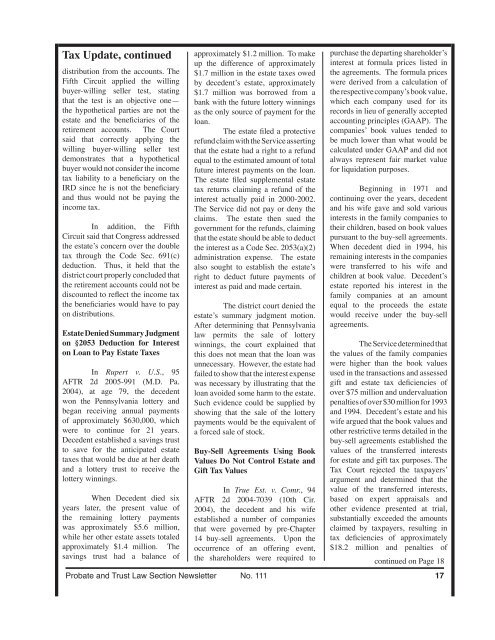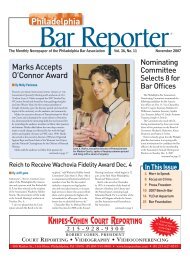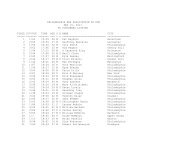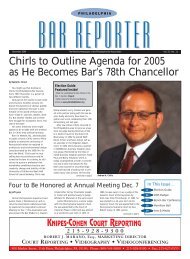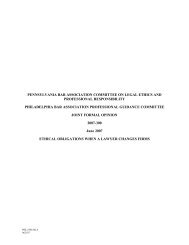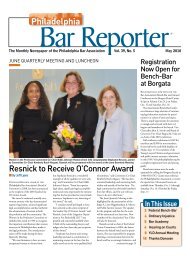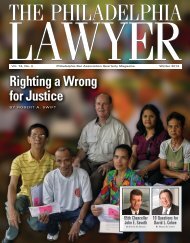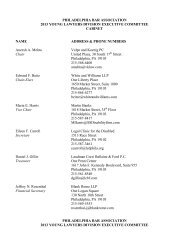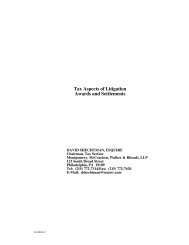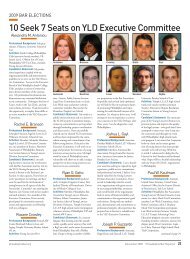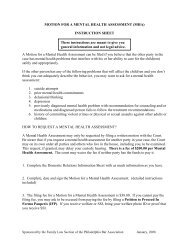Probate & Trust Newsletter: April 2005 - Philadelphia Bar Association
Probate & Trust Newsletter: April 2005 - Philadelphia Bar Association
Probate & Trust Newsletter: April 2005 - Philadelphia Bar Association
Create successful ePaper yourself
Turn your PDF publications into a flip-book with our unique Google optimized e-Paper software.
Tax Update, continued<br />
distribution from the accounts. The<br />
Fifth Circuit applied the willing<br />
buyer-willing seller test, stating<br />
that the test is an objective one—<br />
the hypothetical parties are not the<br />
estate and the beneficiaries of the<br />
retirement accounts. The Court<br />
said that correctly applying the<br />
willing buyer-willing seller test<br />
demonstrates that a hypothetical<br />
buyer would not consider the income<br />
tax liability to a beneficiary on the<br />
IRD since he is not the beneficiary<br />
and thus would not be paying the<br />
income tax.<br />
In addition, the Fifth<br />
Circuit said that Congress addressed<br />
the estateʼs concern over the double<br />
tax through the Code Sec. 691(c)<br />
deduction. Thus, it held that the<br />
district court properly concluded that<br />
the retirement accounts could not be<br />
discounted to reflect the income tax<br />
the beneficiaries would have to pay<br />
on distributions.<br />
Estate Denied Summary Judgment<br />
on §2053 Deduction for Interest<br />
on Loan to Pay Estate Taxes<br />
In Rupert v. U.S., 95<br />
AFTR 2d <strong>2005</strong>-991 (M.D. Pa.<br />
2004), at age 79, the decedent<br />
won the Pennsylvania lottery and<br />
began receiving annual payments<br />
of approximately $630,000, which<br />
were to continue for 21 years.<br />
Decedent established a savings trust<br />
to save for the anticipated estate<br />
taxes that would be due at her death<br />
and a lottery trust to receive the<br />
lottery winnings.<br />
When Decedent died six<br />
years later, the present value of<br />
the remaining lottery payments<br />
was approximately $5.6 million,<br />
while her other estate assets totaled<br />
approximately $1.4 million. The<br />
savings trust had a balance of<br />
approximately $1.2 million. To make<br />
up the difference of approximately<br />
$1.7 million in the estate taxes owed<br />
by decedentʼs estate, approximately<br />
$1.7 million was borrowed from a<br />
bank with the future lottery winnings<br />
as the only source of payment for the<br />
loan.<br />
The estate filed a protective<br />
refund claim with the Service asserting<br />
that the estate had a right to a refund<br />
equal to the estimated amount of total<br />
future interest payments on the loan.<br />
The estate filed supplemental estate<br />
tax returns claiming a refund of the<br />
interest actually paid in 2000-2002.<br />
The Service did not pay or deny the<br />
claims. The estate then sued the<br />
government for the refunds, claiming<br />
that the estate should be able to deduct<br />
the interest as a Code Sec. 2053(a)(2)<br />
administration expense. The estate<br />
also sought to establish the estateʼs<br />
right to deduct future payments of<br />
interest as paid and made certain.<br />
The district court denied the<br />
estateʼs summary judgment motion.<br />
After determining that Pennsylvania<br />
law permits the sale of lottery<br />
winnings, the court explained that<br />
this does not mean that the loan was<br />
unnecessary. However, the estate had<br />
failed to show that the interest expense<br />
was necessary by illustrating that the<br />
loan avoided some harm to the estate.<br />
Such evidence could be supplied by<br />
showing that the sale of the lottery<br />
payments would be the equivalent of<br />
a forced sale of stock.<br />
Buy-Sell Agreements Using Book<br />
Values Do Not Control Estate and<br />
Gift Tax Values<br />
In True Est. v. Comr., 94<br />
AFTR 2d 2004-7039 (10th Cir.<br />
2004), the decedent and his wife<br />
established a number of companies<br />
that were governed by pre-Chapter<br />
14 buy-sell agreements. Upon the<br />
occurrence of an offering event,<br />
the shareholders were required to<br />
purchase the departing shareholderʼs<br />
interest at formula prices listed in<br />
the agreements. The formula prices<br />
were derived from a calculation of<br />
the respective companyʼs book value,<br />
which each company used for its<br />
records in lieu of generally accepted<br />
accounting principles (GAAP). The<br />
companiesʼ book values tended to<br />
be much lower than what would be<br />
calculated under GAAP and did not<br />
always represent fair market value<br />
for liquidation purposes.<br />
Beginning in 1971 and<br />
continuing over the years, decedent<br />
and his wife gave and sold various<br />
interests in the family companies to<br />
their children, based on book values<br />
pursuant to the buy-sell agreements.<br />
When decedent died in 1994, his<br />
remaining interests in the companies<br />
were transferred to his wife and<br />
children at book value. Decedentʼs<br />
estate reported his interest in the<br />
family companies at an amount<br />
equal to the proceeds the estate<br />
would receive under the buy-sell<br />
agreements.<br />
The Service determined that<br />
the values of the family companies<br />
were higher than the book values<br />
used in the transactions and assessed<br />
gift and estate tax deficiencies of<br />
over $75 million and undervaluation<br />
penalties of over $30 million for 1993<br />
and 1994. Decedentʼs estate and his<br />
wife argued that the book values and<br />
other restrictive terms detailed in the<br />
buy-sell agreements established the<br />
values of the transferred interests<br />
for estate and gift tax purposes. The<br />
Tax Court rejected the taxpayersʼ<br />
argument and determined that the<br />
value of the transferred interests,<br />
based on expert appraisals and<br />
other evidence presented at trial,<br />
substantially exceeded the amounts<br />
claimed by taxpayers, resulting in<br />
tax deficiencies of approximately<br />
$18.2 million and penalties of<br />
continued on Page 18<br />
<strong>Probate</strong> and <strong>Trust</strong> Law Section <strong>Newsletter</strong> No. 111 17


